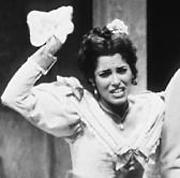ANYONE WHO KNOWS The Marriage of Figaro, the sequel to The Barber of Seville, knows that things get a little rocky for the couple united so happily at Barber‘s end. But while it lasts, Barber—that is, Rossini’s operatic adaptation of Beaumarchais’ original play—percolates along in the highest of spirits. There’s only one down-tempo number in the whole show, and Rossini gets that out of the way first. There’s an opportunity later on for some pathos, when the heroine Rosina mistakenly believes her suitor Count Almaviva has betrayed her. Anyone else would have given the diva an aria of lament, but Rossini cuts away from her, collapsed in grief, to show Almaviva arriving just in time to elope with her (accompanied by a cute little orchestral thunderstorm).
The Barber of Seville
Opera House through May 20
The danger of such unalloyed mirth, however, is that it deprives the characters of a third dimension, and they risk appearing as types rather than real human beings. It’s up to the cast’s acting ability to bring these characters to life; Rossini’s zippy score gives them less help than Mozart’s in the slightly darker Figaro.
The excellent Kurt Streit brings Almaviva not only aristocratic ardor, but also the ability to make a lightning switch into broad farce. His tenor is attractive, his coloratura maybe a bit effortful. As the blustering Bartolo, Rosina’s guardian and would-be husband, John Del Carlo sings and acts with a wonderful bullish energy, a worthy antagonist. Earle Patriarco plays the title role. His is not a rough-and-ready propeller of the plot, but a strutting, smirky, and even slightly foppish Figaro—complete with ringing high notes.
Vivica Genaux (an Alaskan despite that irresistibly Continental name) made a triumphant company debut as Rosina, convincing at every step. What a winning voice—dark at the bottom and a bubbling fountain above. She gets to show off both aspects aplenty in her opening aria, wowing everyone from the start. This is where I probably ought to make some pronouncement such as “destined to be one of the great Rosinas of her generation.” I mean, how would I know? But it wouldn’t surprise me. Even though we live in a golden age of mezzo-sopranos and Rosina is one of the pillars of their repertory, Genaux makes a strong claim to the role.
THE SMALLER ROLES were handled quite well, as they always are at Seattle Opera, especially by familiar faces Byron Ellis as Fiorello, Archie Drake as Ambrogio, and Paul Gudas as the police sergeant. John Relyea is an amusing beanpole of a Don Basilio and Mimi Lerner is delightful as the maid Berta—she takes her charming little Act II song and rules the stage with it.
Despite all this talent, all the characters had a sort of puppet-on-a-string quality that no one was quite able to shake. There’s a lot of busyness in this Barber, a lot of distracting activity imposed from without (actually, from director Linda Brovsky), and in general, the more manic it became, the less funny it was. Basilio’s show-stopping “La calunnia,” for one example, fell flat, weighed down by shtick. (The one odd exception in the other direction was Figaro’s famous entrance aria, “Largo al factotum.” As the chattering orchestral intro started up, the first person we see is a little girl, followed by a few more children. Now, I’m a sucker for kids in opera, but what a comedown to see them moved around like chess pieces in a curiously static staging.)
John Stoddart’s set was pretty and clever, and the Seattle Symphony sounded crisp and clean under conductor Edoardo Mller, though he occasionally seemed a little overcautious about their volume level. All in all, a good Barber that would be a great one if everyone would just calm down a notch and let the comedy come from the characters, who right now are overwhelmed by all the rushing about.







